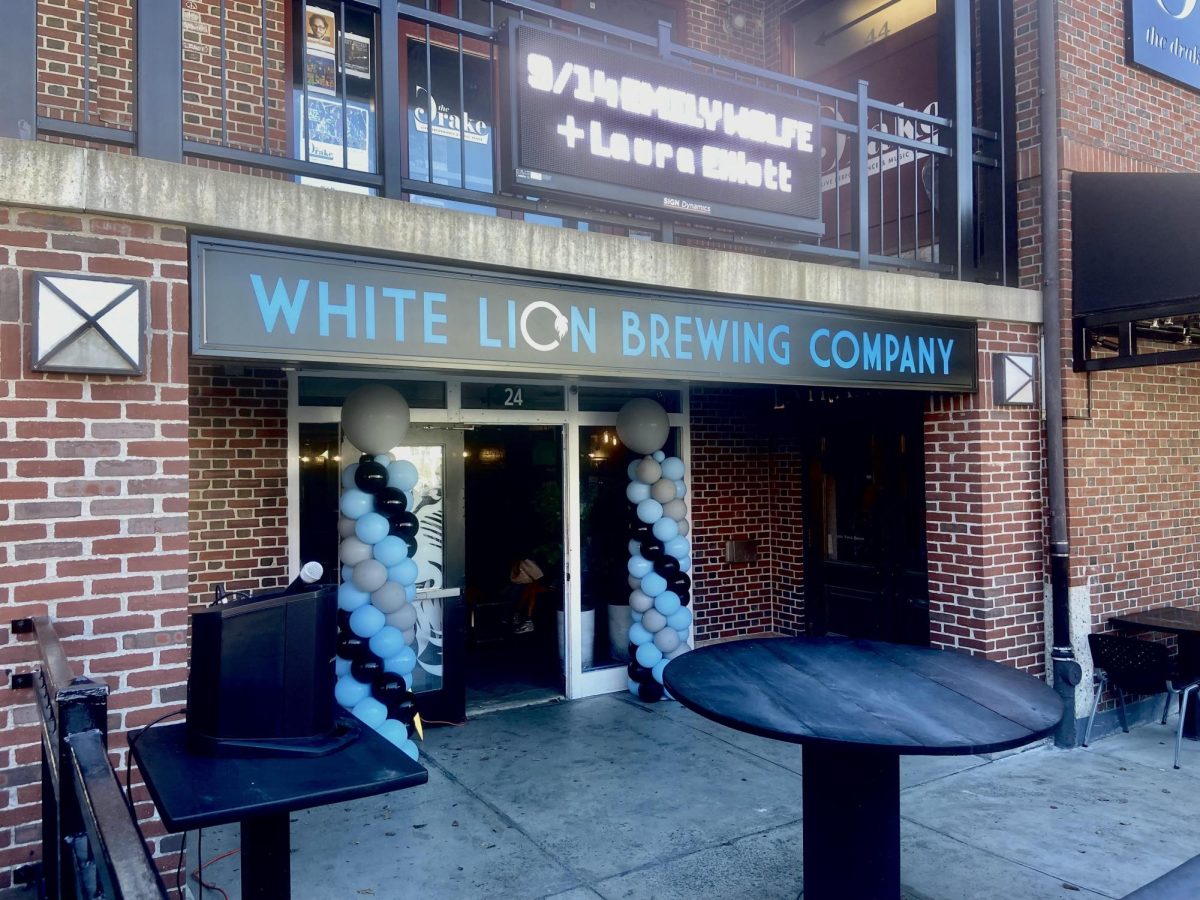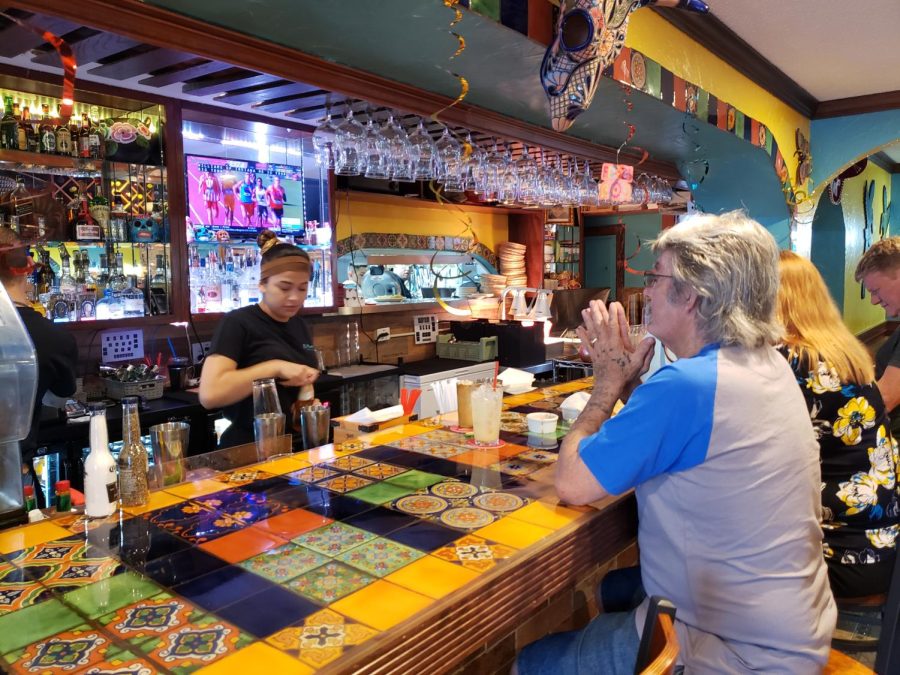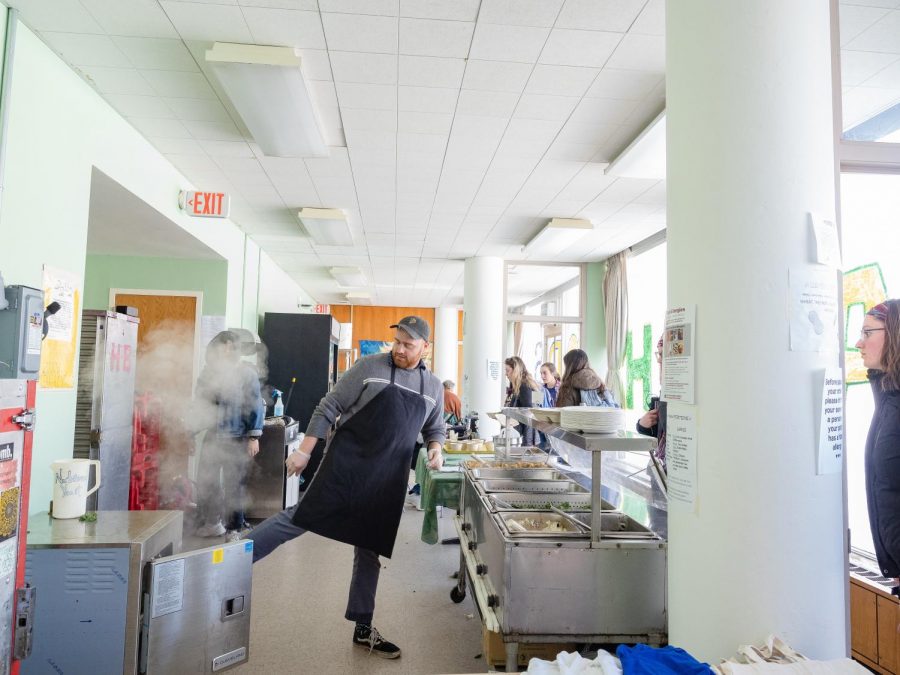
On an early Friday afternoon mission, I rushed into People’s Market just before it closed at 2 p.m. The atmosphere gave a mixed vibe of a modernist artist’s studio and a local farmer’s market: the walls and floor were a plain gray, the large windows let in the entirety of the daylight outside, exotic candies and health food products were scattered in glass coolers and jars, and tasteful, classic rock blared through the stereo. The workers, moving slowly and sleepily after a long first week of classes, were getting ready to close up shop. I walked up to the cashier and asked, “What kind of brews do you have?”
The cashier, probably more than ready to finish his shift and start his weekend, was excited to show me their coffee. After paying my surprisingly small fee, he left the counter to show me the coffee station. It was simple enough: stacks of white paper cups with the People’s Market logo, cream, sugar, and three coffee dispensers of different brews. My options that day were French Vanilla Kiss, Italian Espresso Roast and Aztec Two Step Decaf. He pulled out the bags of beans that they brewed the coffee with and guided me through the process of choosing a flavor. I met a friend there for coffee and catching up, and we each got a different flavor, so I technically only missed out on one flavor – French Vanilla Kiss. My friend got the decaf while I got the espresso roast, and both were, needless to say, fabulous.
It’s not a secret that, despite University of Massachusetts Dining being second best in the country, according to the Princeton Review, our coffee could use some improvement. Luckily, there are scores of coffee venues in the area, both on and off campus. When I asked friends and fellow students where to get the best coffee beyond the dining halls, the overwhelming response was People’s Market.
For those that don’t know, People’s Market is a hole-in-the-wall café across the hall from Earthfoods Cafe in the Student Union. Founded in 1973 as a collective of women, but now comprised of undergraduate workers of all types, it is one of the oldest student-run businesses on campus. According to their website, they are known not just for their coffee but also for “herbal teas, fresh bagels, gourmet cheeses, healthy snacks, chilled beverages, yogurt, chocolate and women’s health products.”
If you like a good cup of coffee, you’ll like People’s Market. Justine McAllister, one of the roughly dozen current co-managers currently working at the co-op, said that People’s Market buys all of their coffee from Dean’s Beans, a company located in Orange, about a half-hour car ride from Amherst, because they handle only organic, fair trade coffee beans. According to the People’s Market website (where they pride themselves on being “the original and best source on campus for 100 percent organic and fair-trade coffee”), the company was recently invited by the United Nations Social and Economic Counsel to “give advice on issues regarding the Millennium Development Goals and barriers to sustainable development.” Jay Newman, a psychology and sociology major who has worked at People’s Market for three semesters, said “practically every customer (is) telling us it’s the best coffee on campus.”
There are always three different types of coffee at a time: a regular brew – either a dark roast, a medium roast or a medium/dark blend – a flavored brew and a decaf. Different flavors circulate as soon as each 5 pound bag they receive from Dean’s Beans is emptied, which is typically every two days or so. Flavors include Columbian, French Vanilla Kiss, Hazelnut Dream, Guatemalan French Roast, Italian Espresso Roast, Peruvian French Roast Decaf and Aztec Two Step Decaf. The dark Italian Espresso Roast is also used to make iced coffee. The beans are certified organic, fair trade and kosher.
According to Newman, the People’s Market currently has Colombian and Mexican Chiapas for medium roasts, Ethiopian Oromia, Ring of Fire and Roadhouse Blend for dark roasts, and a new medium/dark blend called Thunder Mug, which is a combination of Asian and Central American beans.
Sustainable and affordable
Matt Harbut, who has worked at the People’s Market since the fall 2014 semester, said that the proceeds from the coffee beans support development projects in remote regions “to protect people’s culture, support reforestation projects and provide essential medical services that are lacking in these places because they don’t have the infrastructure.”
Customers are rewarded for being sustainable, too. If you bring in your own reusable bottle or mug, any hot coffee only costs $1.50 no matter how large the bottle is. That is compared to the already-cheap price of $1.50 for their small coffee. Likewise tea only costs $0.75 if you bring your own container.
Aside from coffee, the People’s Market is also known for their numerous vegan, vegetarian and gluten-free products. Benson’s Bagels delivers fresh bagels every day, and the Henion Bakery provides pastries. Harbut said there are “like a dozen spreads and tons of veggies and different varieties of cheese” for the bagels. Good For You Tea provides tea and other health products.
According to Newman, the Market just began buying from the UMass Student Farm and is now able to sell “in-season produce like peppers, plums, apples, and flowers.”
Newman attests that the Katalyst Kombucha, which is a fermented traditional beverage, made from a culture and sweetened tea, is a “fan favorite” that “flies off the shelf whenever we get a delivery.” All three co-managers agreed that their iced chai is a favorite for customers as well. The co-op makes cold brew daily and in small batches.
The student-run business, like many on campus, strives for social justice and ethical services. It is managed entirely by full-time undergraduate students. All of its products support local and sustainable businesses.
People’s Market prides itself on only supporting socially and environmentally responsible companies. They are a student run co-operative and therefore have no form of hierarchy. There are no employees, only co-managers with equal individual responsibilities. Newman, for example, is on the Buying Committee, which is responsible for buying their coffee and other products they sell. They also have an Advertising Committee, which works through social media, flyers and campus events. McAllister said that being a co-manager instead of an employee is a lot more work, but it is rewarding knowing that they are working toward a common mission.
Newman described the system as being “your own boss” while everyone shares responsibility equally.
“Undergraduates are controlling everything you see when you come into the store – from making the coffee, studying the ethics of our products, to hiring the new peeps that are brought in the market,” he said.
“We all have equal say in decision made about the market from what products we carry to how long we’re open or what colors the walls are,” Harbut said. “We get advising help on things like loans and different business decisions from the Center for Student Business, but other than that, we’re completely student-run since day one.”
McAllister calls the market a “space for people to express themselves, eat good food, and listen to loud music.” Loud music is certainly a part of the People’s Market experience – when walking in and ordering, I could barely hear the soft-spoken cashier over the stereo. But I have to admit the struggle to have a conversation was part of the charm.
Plans to improve
Newman said that the market is in the beginning stages of implementing some new ways to make the store more sustainable and working with some other co-ops. Harbut also said the business is going to offer samples of all new products so everyone can try them and decide how they feel about them.
Harbut also said there will be a new store layout.
“We call it ‘flo-pen,’” Harbut said. “The store flows a lot more and has open space.”
When it comes to a hopeful future where the business may accept Dining Dollars, McAllister said, “It’s hard to say how close we are to this goal. … We’ve signed petitions and spoken with many Dining Services employees about this but ultimately it is up to the University to make the switch.”
A meal plan that makes it cheaper to get coffee elsewhere, she admitted, significantly hurts business.
“Being able to receive (Dining Dollars) as payment would put us in a spot to actually be competitive with other on campus coffee shops,” she said.
Newman calls being the only food-based student business co-op that doesn’t accept YCMP and Dining Dollars “ostracizing.”
“There are so many customers who want to support us through the currencies that are accessible everywhere else on campus, except us, and we have to turn them down,” he said. “It’s really unclear where we actually stand regarding accepting them – I personally hope that the (Student Government Association) and other student businesses will not forget to continue fighting for and with us now that Sweets N’ More, Earthfoods, Sylvan Snackbar and Greeno Sub Shop have what we don’t. If we were to accept YCMP and Dining Dollars it would release this giant cloud of anxiety that resides over us about how we perform financially.”
The decision for four student-run businesses on campus to accept Dining Dollars was certainly a long-awaited victory and blessing for students on meal plans. But People’s Market was left out of the deal because “through some sleight of hand, People’s Market was labeled a non-food business and left out of the deal,” Harbut explained.
For now, the business is doing what they can to provide affordable and delicious food to the campus community. And until the business accepts Dining Dollars, they still thrive on their good reputation to yield otherwise-profitable business from loyal students.
Sarah Gamard can be reached at [email protected].

















